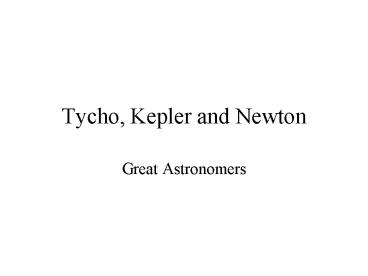Tycho, Kepler and Newton - PowerPoint PPT Presentation
1 / 12
Title: Tycho, Kepler and Newton
1
Tycho, Kepler and Newton
- Great Astronomers
2
Tycho Brahe - An Observer
- Tycho Brahe was a prominent scholar and
aristocrat in Denmark in the mid-late 1500's - He made a huge number of observations of the
stars and planets, all with the naked eye - Even without a telescope, he was very accurate in
his measurements - Also recorded the appearance of comets and
supernovae - The Tycho supernova remnant is still visible today
Tycho (1546-1601)
3
Johannes Kepler - A Theorist
- Shortly before his death, Tycho began working
with another scientist named Kepler - Kepler was put to the task of creating a model to
fit all of Tycho's planetary data - Kepler spent the remainder of his life
formulating a set of laws that explained the
motion of the planets
Kepler (1571 - 1630)
4
Kepler's First Law
- Kepler first noted that the orbital path of a
planet around the Sun is an ellipse, not a
perfect circle - The Sun lies at one of the foci of the ellipse
- The eccentricity of an ellipse is a measure of
how 'squished' from a circle the shape is - Most planets in the Solar System are very close
to a perfect circle
Focus
Focus
Kepler's 1st Law The orbital paths of the
planets are elliptical with the Sun at one focus.
5
Kepler's Second Law
- Kepler also noticed that the planets sweep out
equal areas in their orbit over equal times - Notice that this means the planet must speed up
and slow down at different points - If it takes the same amount of time to go through
A as it does C, at what point is it moving
faster? - C, when it is closest to the Sun
Kepler's 2nd Law An imaginary line connecting
the Sun to any planet sweeps out equal areas of
the ellipse over equal intervals of time.
6
Kepler's Third Law
- Finally, Kepler noticed that the period of
planet's orbit squared is proportional to the
cube of its semi major axis - This law allowed the orbits of all the planets to
be calculated - It also allowed for the prediction of the
location of other possible planets
Kepler's 3rd Law Simplified
NOTE In order to use the equation as shown, you
must be talking about a planet in the Solar
System, P must be in years, and a must be in A.U.
!!!
7
Isaac Newton
- Kepler's Laws were a revolution in regards to
understanding planetary motion, but there was no
explanation why they worked - That explanation would have to wait until Isaac
Newton formulated his laws of motion and the
concept of gravity - Newton's discoveries were important because they
applied to actions on Earth and in space - Besides motion and gravity, Newton also developed
calculus
Newton (1642-1727)
8
Newton's First Law
- Newton's first law states An object at rest will
remain at rest, an object in motion will stay in
motion - UNLESS acted upon by an outside force - This is why you should always wear a seat belt!
Outside Force
9
Newton's Second Law
- Acceleration is created whenever there is a
change in velocity - Remember, this can mean a change in magnitude
AND/OR direction - Newton's Second Law
- Notice how this equation works
- The bigger the mass, the larger the force
- The bigger the acceleration, the larger the force
10
Newton's Third Law
- Newton's Third Law states For every action,
there is an equal and opposite reaction - Simply put, if body A exerts a force on body B,
body B will react with a force that is equal in
magnitude but opposite direction - This will be important in astronomy in terms of
gravity - The Sun pulls on the Earth and the Earth pulls on
the Sun
11
Newton and the Apple - Gravity
- After formulating his three laws of motion,
Newton realized that there must be some force
governing the motion of the planets around the
Sun - Amazingly, Newton was able to connect the motion
of the planets to motions here on Earth through
gravity - Gravity is the attractive force two objects place
upon one another
12
Revisions to Kepler's Laws
- Newton's law of gravity required some slight
modifications to Kepler's laws































